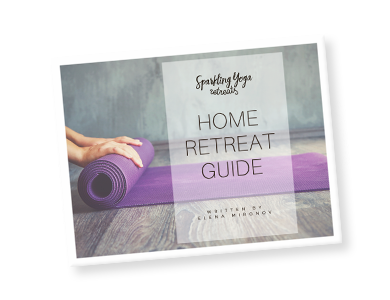Radiant Skin and Nourished Body: Ayurveda Winter Guide III
Feeling balanced in Winter can be a tricky task.
Ayurveda states that we are susceptible to two major influences in Winter: Vata and Kapha.
Both Vata and Kapha are Ayurvedic constitutions that combine two elements each.
Vata combines in itself the elements of air and space. The primary qualities that Vata offers are dry, cold, light, rough, mobile, subtle.
Late Autumn (and change of seasons in general) as well as early Winter can aggravate Vata, making us more prone to experiencing the symptoms of imbalance: dry and rough skin, restlessness of mind, constipation, cough.
We can balance Vata by offering the body and mind the qualities, activities and self care practices that complement or balance out the Vata: warm liquid foods (think soups), stable routine (waking up and going to bed are of particular importance), oiling of the skin, meditation, warming yoga practice.
Another influence to consider is Kapha - it's an Ayurvedic constitution as well. Kapha combines the elements of water and earth, and the qualities of Kapha are heavy, cold, moist, dense, oily, slow, static.
When Winter sets in and the snow comes, we are more prone to experience the effects of Kapha. When there is too much Kapha quality in the environment around us, we are more likely to experience the symptoms of Kapha imbalance: slow metabolism, putting on extra weight, sluggish digestion, low motivation and drive, a feeling of heaviness in both body and mind.
We can balance Kapha by offering the body and mind all that helps us keep it in check: regular movement (including vinyasa flow yoga and brisk walks + outdoor activities/sports), warm light foods with Ayurvedic spices, sauna, an early and active start to the day.
But how do you take BOTH Vata and Kapha into account in your self care this Winter?
Let's find out!
1. Healthy scalp and luscious hair
Dry, itching scalp and lifeless hair is a common thing in Winter. It's not surprising actually as we spend lots of time indoors, and the air inside houses and apartments is usually super dry due to central heating.
Ayurveda recommends oiling the scalp and letting the oils soak in before you wash your hair. The best oils for balancing hair and scalp are sesame, sweet almond and bhringaraj. These oils are excellent for soothing your scalp and making hair lush, rich and beautiful.
Using a small amount of pre-warmed oil in your fingertips, rub your head and scalp all over while applying some gentle pressure. Try working your way from the ears to the middle of your head. Repeat on both sides and on the back of the head. This improves oxygen supply to your skin and also has a calming and relaxing effect on the nervous system.
If you'd like to nourish your hair as well, spread some warm oil through the hair, and keep the oils on for anywhere between 15 minutes and 2 hours. To wash it off, don't use water at first, otherwise you hair will remain greasy. Shampoo your hair without water, then with a little bit of water, and finally rinse everything off. Shampoo once more, this time with water. You won't be needing your conditioner this time!
Last but not least: always make sure to cover your head and ears while outside, as the ears are one of the sites where Vata influences are most predominant.
2. DIY Warm oil massage
Warm oil massages are the perfect Winter treat for your body and soul.
However, if booking an appointment with a professional is too expensive or too time consuming, you can definitely do it yourself.
Detailed guide to abhyanga - Ayurvedic warm oil massage - is here. Enjoy!
3. Happy feet
Your feet can definitely use a bit of extra care this Winter. Foot massages are actually some of the most grounding and relaxing practices for balancing Vata according to Ayurveda.
Start by soaking your feet in warm water with a few drops rosemary, eucalyptus and/or lavender oil. After 10 minutes, gently rub them dry and apply a bit of almond or castor oil to your feet, and massage the oil in. Put a pair of socks on for the night to let the oil soak in and soften the skin of your feet.
It's a great goodnight ritual for kids, too.
4. Radiant Winter skin
The biggest skin challenge in Winter for most of us is dryness.
As with many other things, Ayurveda prescribes oils - and sweating!
My recommendation would be making your skin routine minimalistic but effective, with a strong emphasis on hydration.
Use very gentle skin cleansers in the evening and moisturise with argan and rose hip oil.
During the day, moisturise with a cream of your choice, or, if your skin enjoys it, with pure almond oil. Minimise makeup if you use it.
Remember to give your skin an opportunity to regenerate itself and to clear the pores - sweating. Sweating is important for your skin's health, and I mean both sweating when you exercise or do your yoga practice and when you warm yourself up in a sauna.
An important note on saunas: Ayurveda is positive about saunas. Just remember to not overheat your head by wrapping a towel around it. Or even better, opt for milder steam bath instead of dry Finnish sauna, and apply a bit of sesame or almond oil on your skin before your sauna rituals!
I hope these Winter tips have been helpful - drop me a line and let me know how these tips are working out for you!

